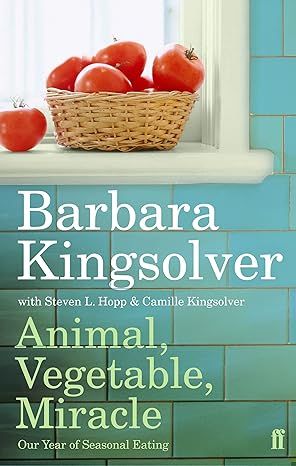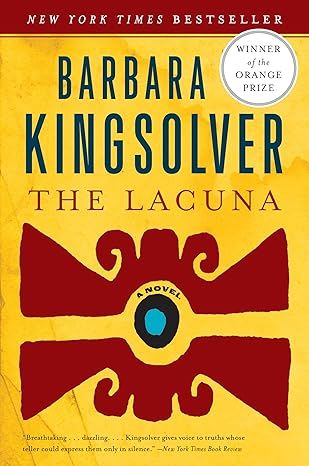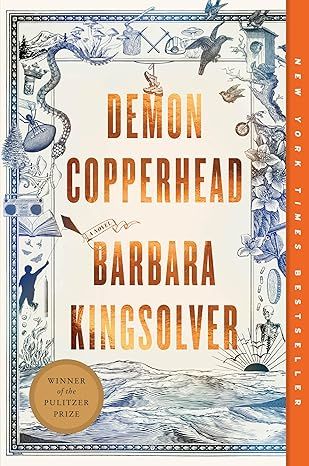Unsheltered: A Novel
4.2
-
12,750 ratings
New York Times Bestseller • Named one of the Best Books of the Year by NPR, O: The Oprah Magazine, San Francisco Chronicle, Christian Science Monitor and Newsweek
“Kingsolver brilliantly captures both the price of profound change and how it can pave the way not only for future generations, but also for a radiant, unexpected expansion of the heart.” — O: The Oprah Magazine
The acclaimedauthor of The Poisonwood Bible and The Bean Trees, and recipient of numerous literary awards—including the National Humanities Medal, the Dayton Literary Peace Prize, and the Orange Prize—returns with a story about two families, in two centuries, navigating what seems to be the end of the world as they know it. With history as their tantalizing canvas, these characters paint a startlingly relevant portrait of life in precarious times when the foundations of the past have failed to prepare us for the future.
How could two hardworking people do everything right in life, a woman asks, and end up destitute? Willa Knox and her husband followed all the rules as responsible parents and professionals, and have nothing to show for it but debts and an inherited brick house that is falling apart. The magazine where Willa worked has folded; the college where her husband had tenure has closed. Their dubious shelter is also the only option for a disabled father-in-law and an exasperating, free-spirited daughter. When the family’s one success story, an Ivy-educated son, is uprooted by tragedy he seems likely to join them, with dark complications of his own.
In another time, a troubled husband and public servant asks, How can a man tell the truth, and be reviled for it? A science teacher with a passion for honest investigation, Thatcher Greenwood finds himself under siege: his employer forbids him to speak of the exciting work just published by Charles Darwin. His young bride and social-climbing mother-in-law bristle at the risk of scandal, and dismiss his worries that their elegant house is unsound. In a village ostensibly founded as a benevolent Utopia, Thatcher wants only to honor his duties, but his friendships with a woman scientist and a renegade newspaper editor threaten to draw him into a vendetta with the town’s powerful men.
A timely and "utterly captivating" novel (San Francisco Chronicle), Unsheltered interweaves past and present to explore the human capacity for resiliency and compassion in times of great upheaval.
Read more
Kindle
$13.99
Available instantly
Audiobook
$0.00
with membership trial
Hardcover
$29.66
Paperback
$17.22
Ships from
Amazon.com
Payment
Secure transaction
ISBN-10
0062684736
ISBN-13
978-0062684738
Print length
480 pages
Language
English
Publisher
Harper Perennial
Publication date
October 14, 2019
Dimensions
5.31 x 1.05 x 8 inches
Item weight
2.31 pounds
Popular Highlights in this book
When someone mattered like that, you didn’t lose her at death. You lost her as you kept living.
Highlighted by 2,518 Kindle readers
Unsheltered, I live in daylight. And like the wandering bird I rest in thee.
Highlighted by 1,488 Kindle readers
To stand in the clear light of day, you once said. Unsheltered.
Highlighted by 1,207 Kindle readers
Product details
ASIN :
B075WQK8ZJ
File size :
7931 KB
Text-to-speech :
Enabled
Screen reader :
Supported
Enhanced typesetting :
Enabled
X-Ray :
Enabled
Word wise :
Enabled
Editorial Reviews
“Kingsolver’s dual narrative works beautifully. By giving us a family and a world teetering on the brink in 2016, and conveying a different but connected type of 19th-century teetering, Kingsolver creates a sense…that as humans we’re inevitably connected through the possibility of collapse, whether it’s the collapse of our houses, our bodies, logic, the social order or earth itself…In this engaged and absorbing novel, the two narratives reflect each other, reminding us of the dependability and adaptiveness of our drive toward survival.” — Meg Wolitzer, New York Times Book Review
“Utterly captivating…Keenly observed and thought-provoking…Kingsolver’s much-demonstrated talent for developing truly believable characters is, once again, on full display…Perhaps, more importantly, it’s the characters’ hardscrabble circumstances—especially in the modern story—that resonate right down to the bone.” — San Francisco Chronicle
“Kingsolver brilliantly captures both the price of profound change and how it can pave the way not only for future generations, but also for a radiant, unexpected expansion of the heart.” — O: The Oprah Magazine, 15 Best Books of 2018
“I felt almost bereft closing the cover on this book… With a spellbinding narrative and its exquisitely accurate evocation of two eras, Barbara Kingsolver’s novel is itself a shelter of sorts. One doesn’t want to leave it.” — Helen Klein Ross, Wall Street Journal
“Barbara Kingsolver’s latest novel, Unsheltered, will make you weep…But Kingsolver is also downright hilarious…Unsheltered is also a sociopolitical novel tackling real-world issues, especially how we humans navigate profound changes that threaten to unmoor us.” — O, the Oprah Magazine
“Barbara Kingsolver does something amazing in her new novel…Uncovering and appreciating the connections between the two stories, historical and contemporary, is the best reason to read the book…Both stories are compelling as Thatcher and Willa lead their families during dangerously uncertain times.” — Associated Press
“UNSHELTERED’s title suggests a roof gone missing. But it’s also a resonant call to be more alert to our social predicaments, to ‘stand in the clear light of day.’” — USA Today
“Unsheltered is a skillful blend of fact and fiction told in alternating chapters... It’s a winner all the way…an absolute giant of a book.” — New York Journal of Books
“Nuanced and convincing…Engrossing.” — Jane Ciabattari, BBC News “Preview”
“Sophisticated storytelling, compelling characters and sharp humor…Kingsolver is a writer who can help us understand and navigate the chaos of these times.” — Minneapolis Star Tribune
“Kingsolver’s meticulously observed, elegantly structured novel unites social commentary with gripping storytelling…Containing both a rich story and a provocative depiction of times that shake the shelter of familiar beliefs, this novel shows Kingsolver at the top of her game.” — Publishers Weekly (Boxed and Starred review)
“As always, Kingsolver gives readers plenty to think about. Her warm humanism coupled with an unabashed point of view make her a fine 21st-century exponent of the honorable tradition of politically engaged fiction.” — Kirkus Reviews (starred review)
“Exceptionally involving and rewarding…There is much to delight in and think about while reveling in Kingsolver’s vital characters, quicksilver dialogue, intimate moments, dramatic showdowns, and lushly realized milieus…An enveloping, tender, witty, and awakening novel of love and trauma, family and survival, moral dilemmas and intellectual challenges…” — Booklist (starred review)
“Riveting…A tour de force of fiction…about this dynamic conflict between individual expression and communal belonging...One of the most magical parts of UNSHELTERED is how Kingsolver skillfully blends her two narratives into one unified tale, with past and present repeatedly mirroring each other.” — BookPage
“Powerful.” — Book Riot
“A return to the more ambitious, grand scale of novels such as The Lacuna and The Poisonwood Bible…A lively and vividly peopled novel of ideas…Clear throughout the novel is a tension between self-reliance and interdependence.” — The Guardian (feature)
Read more
Sample
1
Falling House
The simplest thing would be to tear it down,” the man said. “The house is a shambles.”
She took this news as a blood-rush to the ears: a roar of peasant ancestors with rocks in their fists, facing the evictor. But this man was a contractor. Willa had called him here and she could send him away. She waited out her panic while he stood looking at her shambles, appearing to nurse some satisfaction from his diagnosis. She picked out words.
“It’s not a living thing. You don’t just pronounce it dead. Anything that goes wrong with a structure can be replaced with another structure. Am I right?”
“Correct. What I am saying is that the structure needing to be replaced is all of it. I’m sorry. Your foundation is nonexistent.”
Again the roar on her eardrums. She stared at the man’s black coveralls, netted with cobwebs he’d collected in the crawl space. Petrofaccio was his name. Pete. “How could a house this old have a nonexistent foundation?”
“Not the entire house. You see where they put on this addition? Those walls have nothing substantial to rest on. And the addition entails your kitchen, your bathrooms, everything you basically need in a functional house.”
Includes, she thought. Entails is the wrong word.
One of the neighbor kids slid out his back door. His glance hit Willa and bounced off quickly as he cut through the maze of cars in his yard and headed out to the alley. He and his brother worked on the vehicles mostly at night, sliding tools back and forth under portable utility lights. Their quiet banter and intermittent Spanish expletives of frustration or success drifted through Willa’s bedroom windows as the night music of a new town. She had no hard feelings toward the vehicle boneyard, or these handsome boys and their friends, who all wore athletic shorts and plastic bath shoes as if life began in a locker room. The wrong here was a death sentence falling on her house while that one stood by, nonchalant, with its swaybacked roofline and vinyl siding peeling off in leprous shreds. Willa’s house was brick. Not straw or sticks, not a thing to get blown away in a puff.
The silence had extended beyond her turn to speak. Mr. Petrofaccio courteously examined the two mammoth trees that shaded this yard and half the block. Willa had admired the pair of giants out her kitchen window and assumed they were as old as the house, but hadn’t credited them with a better life expectancy.
“I have no idea why someone would do that,” he finally offered. “Put up an addition with no foundation. No reputable contractor would do that.”
It did seem to be sitting directly on the ground, now that she looked, with the bottom courses of bricks relaxing out of rank into wobbly rows. A carapace of rusted tin roofing stretched over the gabled third floor and the two-story addition cobbled on the back, apparently in haste. Two tall chimneys leaned in opposite directions. Cracks zigzagged lightningwise down the brick walls. How had she not seen all this? Willa was the one who raised her anxiety shield against every family medical checkup or late-night ring of the phone, expecting the worst so life couldn’t blindside them. But she’d looked up contractors that morning with no real foreboding. Probably assuming her family had already used up its quota of misfortune.
“I can’t hire you to tear down my house and start over.” Willa ran her hands through her hair at the temples, and felt idiotic. Both-hands-on-the-temples was a nervous habit she’d been trying to break for about twenty years, since her kids told her it made her look like The Scream. She shoved her fists into the pockets of her khaki shorts. “We were thinking we’d fix it up, sell it, and get something closer to Philadelphia. We don’t need this much room. Nobody needs this much room.”
On the moral side of things, Mr. Petrofaccio gave no opinion.
“But you’re saying we would have to repair it first to put it on the market. And I’ve noticed about every fourth house in this town has a For Sale sign. They’re all in better shape than this one, is that what you’re telling me?”
“Twenty five percent, that would be a high estimate. Ten percent is about right.”
“And are they selling?”
“They are not.”
“So that’s also a reason not to tear down the house.” She realized her logic in this moment was not watertight. “Okay, you know what? The main thing is we live here. We’ve got my husband’s disabled father with us right now. And our daughter.”
“Also a baby in the picture, am I right? I saw baby items, a crib and all. When I was inspecting the ruptures in the ductwork on the third floor.”
Her jaw dropped, a little.
“Sorry,” he said. “I had to get behind the crib to look at the ductwork. You said you are looking to downsize, so I just wondered. Seems like a lot of family.”
She didn’t respond. Pete extracted a handkerchief from his pocket, mopped his face, blew his nose, and put it away. He must have been braising inside those coveralls.
“That is a blessed event, ma’am,” he suggested. “A baby.”
“Thank you. It’s my son’s child, just born. We’re driving up to Boston this weekend to meet the baby and bring them the crib.”
Pete nodded thoughtfully. “Due respect, ma’am, people usually ask for an inspection before they purchase a house.”
“We didn’t buy it!” She wrestled her tone into neutral. “We inherited. We were in Virginia wondering what to do with some old mansion in New Jersey after my aunt died, and then out of the blue my husband got a job offer from Chancel. A half-hour commute, that’s too good to be true, right?”
“Your husband is a professor up there?” Pete’s nostrils flared, sniffing for money maybe, engaging the common misconception that academics have it.
“On a one-year contract that may not be renewed,” she said, taking care of that. “My aunt had this place rented for quite a while. She was in a facility out in Ocean City.”
“Sorry for your loss.”
“It’s been a year, all right. She and my mother died a week apart, same kind of rare cancer, and they were twins. Seventy-nine.”
“Now that is something. Sad, I mean, but that is like a magazine story. Some of that crazy crap they make up and nobody believes.”
She let out an unhappy laugh. “I’m a magazine editor.”
“Oh yeah? Newsweek, National Geographic, like that?”
“Yeah, like that. Glossy, award winning. Mine went broke.”
Pete clucked his tongue. “You hate to hear it.”
“Sorry to keep you standing out here. Can I offer you some iced tea?”
“Thanks, no. Gotta go check a termite damage on Elmer.”
“Right.” Despite her wish to forget everything he’d told her, Willa found his accent intriguing. Before this move she’d dreaded having to listen to New Jerseyans walking out the doo-ah, driving to the shoo-ah, but South Jersey was full of linguistic surprises. This Pete was the homegrown deal, part long-voweled Philly lowball, part Pennsylvania Amish or something. She watched him scrutinize the garage on the property line: two stories, antique glass windows, thick pelt of English ivy. “You think that building goes with this house?” she asked. “The deed isn’t very clear.”
“That is not yours. That would be the stip house to the property next door.”
“The stip house.”
“Yes ma’am. When they sold these lots back in the day, they had stipulations. Improve the property in one year’s time, show intent to reside, plant trees, and all like that. Folks put up these structures while they got it together to build their real house.”
“Really.”
“You look around this town you’ll see a few, all built on the same plan. Trusses like a barn, fast and cheap. Some guy was doing well in the stip house business I figure.”
“What era are we talking about?”
“Landis,” he replied. “You don’t know about Landis?”
“He’s what, some real estate developer?”
“A king more like, back in the day. This is just a bunch of wild wilderness when he buys it, right? Thirty thousand acres and nobody but Indians and runaway slaves. So he makes this big plan to get people to come. Heaven-on-earth kind of thing.”
“One of those utopian communities? You’re kidding me.”
“I am not. Farms like a picture book. You notice the streets are Plum Peach Apple and all like that? Almond?” He pronounced it owl-mond. She also noted his resistance to contractions, and the recurrent back inna day. She wished for her pocket tape recorder.
“Yeah, I noticed. My daughter goes out to walk the dog and comes home wanting a snack.”
Pete laughed. “Sounds like some healthy kid. All my girls want are those Sour Patch things and the diet pop. I am gonna tell you, it drives the wife crazy.”
Willa had no intention of trying to explain Tig. “So he named it Vineland thinking people would swarm around like fruit flies?”
“Captain Landis was all about the fruit, is what I know. And who knows how to grow grapes but the Italians? So he starts up his own newspaper in the Italian language for attracting the right element. The Petrofaccios came from Palermo, Italy. My nonnie kept a scrapbook of that stuff.”
Willa smiled. “Landis was a wino.”
“No ma’am, that is the crazy thing, there was no drinking alcohol in Vineland whatsoever. That was a very significant rule, back in the day.”
Willa saw holes in this story but still might look into it for a feature: Nineteenth-Century Utopias Gone to Hell. “You’re sure the garage is theirs? Not that I need it.” She laughed. “Unless you think we’ll need a new place to live.”
Unnervingly, he didn’t laugh. “It’s theirs. I can tell by the angle and the setback.”
She assumed the neighbors didn’t know this, or it would be crammed with collateral debris from their garden of broken cars. Pete gave their peeling ranch house a once-over. “Original structure came and went. That is a shame. Those originals were some beautiful old girls in their day. Like yours.”
“Except for her weak foundation. The ruin of many a girl, I guess.”
Pete looked at her, evidently finding this unsuitable material for a joke.
“If it’s such a shame to lose them, shouldn’t ours be saved? Isn’t there grant money for this kind of thing? Historic preservation?”
He shrugged. “Our fair city has got real empty pockets at this moment in time.”
“They must have been loaded at some point. It sounds like this place was built on an immigrant work ethic and old money coming out of the woodwork.”
“Money,” Mr. Petrofaccio said, staring over the dead Fords and Chevys at two girls pushing babies in strollers down the gravel alley, conversing in a musical Asian language. “Where does it all go?”
Willa had been asking the same question. In her family, in her profession and her husband’s, in strained European economies and the whole damned world, where is the cash that once there was? Her husband had a PhD in global politics, her son was an economist, and neither of them seemed all that interested in this mystery that plagued her. Not as it specifically applied.
“That would be the thing here, government money,” Pete offered. “Because no ordinary residential person is going to have what it takes here. There is a time for propping things up, and then there is past time.”
Willa exhaled. “Okay. This isn’t the straightforward consultation I expected. I think you’re saying if we don’t choose to demolish our home, our only other options would be stopgap measures, and none of them looks very good. I guess we’d better schedule another meeting when my husband can be here.”
“Right.” Pete offered her a business card and a condolent handshake. She already knew her gregarious husband would collect this man as a pal. All their married life she’d watched Iano swap phone numbers with plumbers and oil changers, the born Facebook friender, long before Facebook.
“We’ll call you about the next step after I break the bad news. But I’ll warn you, my husband is also going to give you a bunch of reasons why we can’t tear down the house. And they’re not all the same as mine. Between us we can filibuster you.”
Mr. Petrofaccio nodded. “All due respect? I hear that kind of thing all the time. It does not ever get the house fixed.”
Willa spent a restless hour walking around the empty third floor trying to choose a room for her office. After a month in the house she’d gotten things decently organized downstairs but had made no inroads on the top story except for the room she’d nominated as an attic. Alongside the antique crib she’d stashed the usual junk, holiday decorations, underemployed sports equipment, plus boxes of the kids’ keepsakes stretching from preschool finger paintings to Tig’s wacked-out science fair posters and Zeke’s high school yearbooks signed by all the girls who’d found him 2 cute 2 b 4gotten.
Willa now recalled the contractor’s reason for stepping behind the stuff: To inspect ruptured ductwork? Christ. It sounded like an aneurism. What shook her was his cheerful demeanor as he delivered the awful prognosis. Exactly like her mother’s last oncologist.
To steer out of a tailspin she staked her claim on the room that looked down on the automotive neighbors. A view to avoid, some might say, but the leafy afternoon light through the giant beech was gorgeous. And the hardwood floor was in pretty good shape except for the scarred, grayish path that ran the circuit of the four connected third-floor rooms. She remembered Zeke and Tig and one of their now-dead dogs chasing each other through a circular floor plan like this in one of their homes. Which one? Boulder, she thought, recalling mountains out the kitchen window. Hills to which she’d craved to flee, stuck at home with two preschoolers while Iano laboriously blew his first shot at tenure.
These top-floor rooms heated up like a furnace. All the windows in the house reached from floor to ceiling, and most so far had proved unopenable. She leveled a couple of kicks at a frame before giving up, then sat on the floor and unpacked a box of her books into categorical piles. Then angrily repacked them. Nesting was ludicrous, given the doomed state of the nest. She closed her eyes and leaned back against the wall, feeling the rhythmic thrum of Nick’s oxygen compressor on the first floor. Lest she ever relax into solitude, the miasma of her father-in-law and his life support suffused the household. She wished Iano were home. Classes didn’t begin for several weeks but already he had pressing duties galore at his new office.
The word office plucked a pang of nostalgia in her chest. Given her age and profession—midfifties, journalist—she might never again have a working life with colleagues, office gossip, and a regular incentive to get out of sweatpants. The remainder of her productive life revoked overnight felt like an amputation. In her last years at the magazine she was telecommuting more than not, but still the regular drives to the main office on the outskirts of DC had consumed so much life force she’d started envying her friends who were going freelance. Of this envy Willa was cured in no time flat. Now she understood an office had made her official. Her whole career was thrown into doubt retroactively. Did a professional wake up one day with no profession? For sanity’s sake she needed to send out some freelance proposals, and step one was to claim a room of her own. Now even that simple project was tainted with calamity.
She lay on the floor and stared at the concentric brown stains on the ceiling. Iano had proposed they paint over the stain and forget it, because he was Iano. Willa had felt that if timbers up there were leaking their dark fluids, the trouble must run deep enough to warrant calling a contractor. Some tin would need patching, maybe they’d find rot in the roof beams. But the whole house a shambles? The shock settled on Willa as a personal failure. As if she’d invited the disaster by failing to see it coming.
She forced herself up and went downstairs, rousing Dixie from her nap on the front hall rug, clipping on her leash and urging her out the door for a walk. Dixie, with the help of expensive doggie Prozac, had conquered a lifelong terror of car travel and coped with the move from Virginia, but now wanted to spend her remaining days sleeping off the dismay. Willa saw the merits of that program.
“Easy does it,” she coached, wondering what Dixie’s old eyes were making of these Vineland sidewalks that were broken everywhere, heaved up by the bunions of giant old trees. Every street offered a similar view of oak and maple trunks lined up like columns of the Parthenon. The contractor’s utopia story made sense insofar as these trees suggested some thorough city planning over a century ago. She passed in front of the neighbor’s house with its generous corner lot fully planted in autos, then turned south on Sixth and made tedious progress as Dixie inspected every tree trunk. The dog was finicky about emptying her bladder but eager to sniff out the local news, seeming to think it differed from yesterday’s. Like the elderly Vinelanders Willa saw in diner booths poring over the town’s weekly, as if something might have happened here since the last issue.
She crossed Landis Avenue, a bizarrely supersize main street, the width of a four-lane freeway at least. Iano had posed various entertaining theories, but the truth turned out to be mundane: Land Baron Landis had laid out a namesake street to match his ego. He might as well have paved the place in gold. He should see his dying little burg now, with its main drag so deserted Willa felt safe taking out her phone to check the time as she and her legally blind dog casually jaywalked.
She wanted to call Iano with the new installment of their family disaster so he could share her sensation of drowning. But he would be on his way home by now, and Iano was a highly distractible driver. Really it was her mother she’d wanted to call right after the bad news, or in the middle of it, while Mr. Petrofaccio was blowing his nose. First thing in the morning, last thing at night, whenever a fight with Tig left her in pieces, it had been her mother who put Willa back together. When someone mattered like that, you didn’t lose her at death. You lost her as you kept living.
Willa and Dixie passed a pawn shop, the welfare office, a Thai restaurant, and the Number One Chinese Market before heading south again. After five leafy residential blocks, at the corner of Eighth and Quince, Dixie finally elected to pee on the foot of a maple. Most of the houses on this block dated from about the same Victorian era, variously run-down, two for sale. And sure enough, she spotted two garage-like buildings in the backyards, identical in design, disguised by years of divergent use: one sheltered a Honda sedan; the other was an epic man cave covered with old license plates. She pressed her brain for a second to recall the word, then got it: stip. Stipulation houses. Quickie predecessors of the more carefully constructed mansions that were now coming due for collapse.
Dixie waddled homeward and Willa followed, feeling the word shambles in her sternum. How could two hardworking people do everything right in life and arrive in their fifties essentially destitute? She felt angry at Iano for some infraction that wouldn’t hold up to scrutiny, she knew. His serial failures at job security? Not his fault. Plenty of academics spent their careers chasing tenure from city to town. They were a new class of educated nomads, raising kids with no real answer to the question of where they’d grown up. In provisional homes one after another, with parents who worked ridiculous hours, that’s where. Doing homework in a hallway outside a faculty meeting. Playing tag with the offspring of physicists and art historians on some dean’s lawn while the adults swigged cheap Chablis and exchanged companionable gripes about their department heads. Now, without complaint, Iano had taken a teaching position that was an insult to someone with his credentials. As the family’s sole surviving breadwinner, he should get a pass on the charge of being unfit to take a tough phone call while driving.
It never mattered before. Having a mother to shore up Willa had always left Iano free to be the fun, sexy one who didn’t worry even about death or taxes, who brought her flowers picked from other peoples’ yards, who once threw her pain-inflicting shoes out the car window on the way to a formal reception at the provost’s. She couldn’t expect him to be a new kind of person now. She was the crisis handler, he was the evader. Marriages tended to harden like arteries, and she and Iano were more than thirty years into this one. This evening he would come in the door like a blast of warm weather, give her a kiss in the kitchen before changing out of his office clothes, and they’d have no chance to talk before dinner.
So she would drop this bomb on everybody at once. They were all adults, entitled to share her concern about a house falling down on them. Old Nick with his oxygen tank and rabid contempt for the welfare state would be especially vulnerable to the challenges of homelessness. On the other hand, Tig might light a bonfire and dance in the yard as the bricks rained down. Willa had tried and failed to track her daughter’s moral path, but collapse of some permanent structure always seemed to be part of the territory.
Willa’s evening forecast evaporated as she was putting the spaghetti water on to boil. Iano had kissed her and disappeared into the bedroom, as predicted. But now he walked back into the kitchen looking stricken, carrying her phone. Answering her calls and texts was a habit she kept meaning to discuss, but this wasn’t the time. He held the thing as if it were scorching him.
She recoiled. “What? Is it Zeke?”
He nodded, unreadably.
“Is he hurt? God, Iano. What?”
Iano set the phone on the counter and Willa picked it up, shaking. “Hello?”
“Mom, it’s me.”
“Oh Jesus, Zeke, you’re okay. Is the baby okay?”
Zeke was sobbing. Choked. A level of desperation she couldn’t associate with her levelheaded son. She waited without realizing she was holding her breath.
“The baby’s fine,” he said finally. “It’s Helene.”
“Oh no. Some problem from the C-section? It happens, honey. Did she have to go back to the hospital?”
Iano was looking at her with mournful eyes, shaking his head. His face behind the dark, trimmed beard looked scarily pale, and his foreknowledge was disorienting. She turned her back on him and listened to her son’s silence, the gathering of his will.
“Mom, Helene’s dead. She died.”
“Jesus! How?”
The beat of his silence lasted long enough for Willa to wonder if she’d been rude to ask. Her mind battered itself like a trapped bird.
“She took pills,” he finally said. “She killed herself.”
“You had pills around? With a baby in the house?”
“He’s not up to childproof caps, Mom.”
The scolding sobered Willa, put them on solid ground. “Have you called 911?”
“Of course.”
“I’m sorry, I’m just . . . I’m in shock. When did this happen?”
“What time is it now? I got home around a quarter to six. She’s still here.”
“Who is?”
“Mom, Helene. She died in the bedroom. There’s a thing in her mouth. Ventilator. They tried to revive her even though it was hopeless I guess. They said they have to leave that thing in her until the coroner’s report. It’s kind of freaking me out, it pulls her face all out of shape and looks so painful. I guess that’s a stupid thing to worry about.”
“So the EMTs came. Are they still there? What happens now?”
“They left. They had another call that was, you know. Urgent. Now the coroner comes and then the mortuary, to take the body. The EMT gave me numbers to call.”
“Oh, honey. Are you alone there in the apartment?”
“I’m with Aldus.”
God, she thought. Aldus. A few weeks in the world, now this.
“I’m sitting on the couch,” Zeke said, seeming now to want to produce words. “He’s lying beside me, asleep. I guess it wore him out, waiting so long for . . . He was so hungry. And scared, I think. Jesus. How can he not ever know his mother? What does that do to a person?”
“I guess we take this an hour at a time, and right now you shouldn’t be alone. As soon as we’re off the phone, call somebody. I don’t mean the coroner, I want you to have a friend there. Gosh, Helene’s poor parents. How long will it take them to get to Boston?”
The sound he made startled her, an animal moan. The impossible task of calling them had not yet occurred to him.
“Do you want me to talk to them?”
“You’ve never met them. How would that feel, this, coming from a stranger?”
“Okay, but please get somebody there to be with you. You’ll have to decide a lot of things. When Mama died I was shocked at all the practical stuff that has to happen immediately. Do you have any idea about . . . what she would want?”
She listened to Zeke’s breathing as it caught in a sob, tried and caught again, like a halting engine. “We didn’t talk about that, Mom,” he managed. “When the subject of death came up, it was me telling her not to do it.”
“What do you mean?” She turned around but Iano was gone. She stepped to the doorway and looked into the dining room. Tig was playing backgammon with Nick so he wouldn’t throw a tantrum while he waited for dinner. They made an impossible pair facing off across the table: pixie Tig with her springy dreadlocks, hulking Nick with the oxygen tubes pressing his jowls in a permanent grimace.
“This morning she seemed, just, normal,” Zeke was saying. “She took the baby for his checkup yesterday and was relieved he’s, you know. Fine. Gaining weight. Today she was going to take him out in the stroller. We joked about whether she needed an owner’s manual to drive it.”
Willa was amazed at his coherence. People handled emergencies in many ways—she’d covered enough crime scenes to know—but they fell back on the habit of self. This reasonable, desperately sad man on the phone was the bare wood of her son beneath the bark. Willa saw her pasta water was boiling over. She clicked off the burner. “You said when death came up, it was you telling her not to do it. What does that mean, Zeke?”
“I didn’t even kiss her goodbye, Mom. I mean, maybe I did, without knowing it. I can’t even remember. That’s so sad.”
“Are you telling me she had threatened suicide?”
“She should never have gone off the antidepressants. I shouldn’t have let her. Nobody should have asked her to do that.”
“Don’t blame yourself. The drugs were not your call. There must have been risks to the baby. What was she taking?”
“Paroxetine was the one they said she really needed to get away from. They tried her on Sarafem, I think, I don’t remember exactly. They okayed some things after the first trimester but nothing ever worked, once she’d gone cold turkey. She was, like, paralyzed with fear about doing the wrong thing. They have black box warnings on those drugs, Mom. How could she look in the mirror, pregnant, and take a medicine like that? A black box is like ‘Smoking gives you cancer,’ that extreme level of warning.”
Willa felt the weight of Helene transgressions she should have forgiven. The pregnancy whining, the lethargy. “I’m sorry. This must have been so hard for you.”
“It was harder for her. Obviously.”
“I’m sure you didn’t tell her to stop taking her antidepressants.”
“Maybe I expected too much from her. I do that, Mom, I feel like when things seem easy to me, they should be easy for other people. Maybe she felt guilty.”
“I’m sure her doctors advised her. Knowing Helene, she was well informed.”
“But what kind of choice did she have? You can’t imagine what she’s been through. Every day of the pregnancy was hell. She was obsessed with the idea that something was wrong, the baby was dead, or deformed. She memorized the possible side effects of SSRIs in pregnancy. Anencephaly, which is when the baby is born with no brain. Omphalocele, where the intestines protrude through a hole in the abdomen. The whole thing got to be like this monster. She just didn’t want it.”
“What are you saying? Of course she wanted the baby.” Willa had assumed he hadn’t wanted it. Zeke, who at age one put his toys away, the improbable straight-arrow child sprung from the mess of his itinerant parents’ lives, would not gladly interrupt the order of his life’s events with the chaos of an unplanned baby. Willa didn’t even believe he’d neglected birth control. Boys will be boys, she’d heard, but she had only the one, and Zeke did the right thing every time. She and Iano had resisted lobbying for an abortion, but they saw this pregnancy as a duty imposed on their son, if not an ambush. Privately they’d worn out the tread on various speculations. None of their scenarios held a role for a Helene who just didn’t want the baby.
She tried to picture Zeke in his apartment. “Oh, God. Did you . . . find her?”
Tig appeared in the doorway, round eyed, looking painfully small in her baggy clothes, the corona of hair standing up around her head in a caricature of shock. She must have overheard some of this and was reading the rest in Willa’s face.
Willa pointed at the package of pasta and jar of sauce and raised her eyebrows in a plea. With this daughter no wish was easily granted. Willa expected resistance as she stepped away from the stove, but Tig slid into the gap and began making dinner.
“Yeah, I did,” Zeke said. “I got home from work and the baby was crying so hard he was choking. It freaked me out. I don’t know how long he’d been . . . I changed his diaper, warmed up a bottle, fed him. I thought she was asleep. She’s been sleeping so much, all these months. So I spent maybe an hour in the house like that, letting her sleep. Jesus, Mom. What if I’d gone in the bedroom sooner? What if I could have saved her?”
“The baby had been crying awhile when you got home, so she was gone already. Don’t do that to yourself. Please, honey. You took care of your son.”
The weight of these words hit Willa as she said them, a punch to the gut that must have produced a sound because Tig turned around, alarmed. It took effort for Willa to stay on her feet instead of sinking to the floor and pulling her knees to her chest as she cradled Zeke’s voice in her ear. Her dutiful, promising son would be taking care of a child now, every day, marooned in the loneliness of single parenthood. Anger at the dead Helene rose like acid in her throat. So useless.
Tig stood watching her with the air of a fairy godmother, the wooden spoon tilting up from her fingers like a wand. Behind her the pot boiled. Willa closed her eyes and made herself speak calmly into the phone. “I can get there by morning.”
Read more
About the authors
Barbara Kingsolver
Barbara Kingsolver was born in 1955 and grew up in rural Kentucky. She earned degrees in biology from DePauw University and the University of Arizona, and has worked as a freelance writer and author since 1985. At various times she has lived in England, France, and the Canary Islands, and has worked in Europe, Africa, Asia, Mexico, and South America. She spent two decades in Tucson, Arizona, before moving to southwestern Virginia where she currently resides.
Her books, in order of publication, are: The Bean Trees (1988), Homeland (1989), Holding the Line: Women in the Great Arizona Mine Strike (1989), Animal Dreams (1990), Another America (1992), Pigs in Heaven (1993), High Tide in Tucson (1995), The Poisonwood Bible (1998), Prodigal Summer (2000), Small Wonder (2002), Last Stand: America's Virgin Lands, with photographer Annie Griffiths (2002), Animal, Vegetable, Miracle: A Year of Food Life (2007), The Lacuna (2009), Flight Behavior (2012), Unsheltered (2018), How To Fly (In 10,000 Easy Lessons) (2020), Demon Copperhead (2022), and coauthored with Lily Kingsolver, Coyote's Wild Home (2023). She served as editor for Best American Short Stories 2001.
Read more
Reviews
Customer reviews
4.2 out of 5
12,750 global ratings
chris a.
5
Beautiful story.
Reviewed in the United States on July 25, 2024
Verified Purchase
Love how it taught me about equity, in new ways. The daughter TIg and her mom are wonderful characters.
Lynn Brylowe
5
Loved it
Reviewed in the United States on July 10, 2024
Verified Purchase
Couldn't put this book down. I'm much more conservative than Kingsolver but I still can relate to her points of view, she writes so well.
Amazon Customer
5
A novel for our times
Reviewed in the United States on January 21, 2024
Verified Purchase
Precarity is a word that seems to have sprung into existence in recent decades as our economy shifts and much that was considered valued, dependable work has disappeared. Kingsolver brings her practiced eye to noticing the ways living on un-firm foundations affects us and our relationships. She contrasts a modern household in a house in the midst of physical demise and questionable future work opportunities with a late 19th century household facing the same problem. It helps one to clarify in what ways "this time is different" and in what ways it is just the same. Enjoyed the commentary on emerging science in Darwin's age, the social commentary of our age, the familial relations, and the rich, marital bond of the contemporary protagonist.
Read more
2 people found this helpful
Garth Hallberg
5
The Lit Biz Eats Its Best and Brightest
Reviewed in the United States on November 19, 2018
Verified Purchase
The American novelist, Barbara Kingsolver, writes stories that encourage readers to think while they’re being entertained. Her novels are concerned with the great social issues of our time, such as global climate change and political turmoil.
Publishers have a variety of names for this genre, as though the lit biz can’t quite get a grip on it—social novel, social justice novel, social protest novel, political novel, the literature of social engagement. Whatever these kind of novels are called, they’re generally viewed with suspicion by critics and editors, who see little or no place for social commentary in “literature” or in sales. Happily, that attitude hasn’t stopped Kingsolver’s books from becoming best sellers, and being shortlisted for such prestigious honors as the Pulitzer Prize and the PEN/Faulkner Award.
Kingsolver’s eighth novel, Unsheltered, was published in October. It’s more overtly political than her previous novels, as well is should be in this Time of Trump. It’s also one of the most entertaining and thought-provoking novels I’ve read in quite some time.
The plot revolves around an educated middle-class couple, a de-tenured academic and a freelance writer, as they attempt to fend off poverty and find satisfaction and fulfillment in their lives, even though they’re trapped in the gig economy and the sandwich generation. (Think boomerang children and aging parents, not mayonnaise.) What could be depressing in other hands is both humorous and enlightening. Gritty truths about how we live in Trump’s America are not Photoshopped away, but nonetheless, the characters and readers are left with a renewed sense of optimism, realistic but real.
So why was Unsheltered savaged by critics in two publications that I read faithfully and respect greatly, the New York Times and the Atlantic? Dwight Garner in the Times wrote that the novel was “dead on arrival,” and that “every other conversation threatens to become an op-ed piece of a humanistic monologue out of lesser John Steinbeck or Arthur Miller.” And those are not the worst things he has to say. Merve Emre’s review in the Atlantic is headlined “Liberal Pabulum,” and goes on to say “Tackling the Trump era, she brings us the American family-novel as Sunday talk show—all sound bite, no depth.”
Trying to get beneath the invective, Garner either has a personal axe to grind or he is simply defending the typical lit biz trope that “a novel isn’t an essay.” I think he’s also guilty of a bubble mentality, the bubble in question being the glamorous and wealthy Big Apple. He singles out for criticism one of the most truthful pieces of dialogue in the book, truthful except for economic outliers like Silicon Valley, Manhattan, and parts of Brooklyn and the New York suburbs: “It just seems like…I don’t know. There’s less money in the world than there used to be. I don’t know how else to put it. Like something’s broken.”
Emre, who may be an American but who teaches at Oxford, picks on the same line of dialogue, but apparently for a totally different reason. She seems to think that Kingsolver has only a superficial understanding of the horror show that is America, writing that Unsheltered “fails so dramatically to capture the corrosive realities of liberal capitalism.” (Perhaps she would have been more satisfied if Kingsolver had written, “there’s no money in the world” rather than “less,” a sad truth for about fifty percent of our citizens.)
Moreover, Emre takes conventional lit biz wisdom a step further, or perhaps she’s trying to explain it, by dismissing novels like Unsheltered, as a “middlebrow fantasy that stories can help us get through these dark times.” In other words, novelists, don’t bother to try.
As a novelist, I despair how the lit biz seems determined to rope fence socially-conscious fiction, pooh-poohing any attempt to deal with the major issues that affect our daily lives, and that will affect the daily lives of our children and grandchildren and their children, assuming the planet is still livable. So its heartening to note that Unsheltered is an Amazon Best Book and a New York Times’ bestseller, reaching as high as #2 on the hardcover fiction list.
It would be a shame if influential reviews like Garner’s and Emre’s start to take their toll in sales. My advice is don’t take their advice. Unsheltered is a really good, meaty read that will not disappoint. Buy it!
Read more
75 people found this helpful
john gilbert
4
Not an easy read
Reviewed in the United States on September 2, 2022
Verified Purchase
Barbara Kingsolver is unlike any other author I know. She is all about social justice and brings up more issues than any other author in America I know. I have read every fiction novel she has ever published, and this is by far the most hard hitting with issues beleaguering America today.
Her early books addressed the North American Native problems of recent times, and she went on to write novels about Protestant missionaries in Africa, Communists in Mexico, survival of coyotes in Appalacia and the dieing out of Monarch butterflies in North America. In Unsheltered she brings out all her guns, addressing in no particular order, a very disfunctional health care system, hard working professional people being screwed over by the system, older people dieing without support, a very bad current political climate (without mentioning Trump by name) but villifying the system that saw his elected, climate change, airline travel (a funny but real story of travelling between two very large people in a domestic flight of 7 hours in a middle seat) and just what happens when anyone challenges the current status quo.
This book is about a family in present day, where two professional qualified parents who believed in the dream are screwed over. The story goes back and forth to Vineland in New Jersey, established in the mid 1800's by a man named Landis, where all was promised in his Christian utopian vision, but if he was challenged, watch out. Our main character in this portion is a school science teacher who happens to believe in Darwin against the then total christian dogma of dismissing science (which obviously ties into todays anti science bent by many).
For me, the best parts are in the dialogue between the modern day mum and her daughter Tig, who has rebelled against the current status quo, from achievers to over consumption and the breakdown of modern American society. After spending time in Cuba, she exaults in living with less, helping each other and not believing in the American dream of success. Although the mum is university educated and cognisant of the current pitfalls of the existing unfairness she experiences, she still believes in the dream, with her husband, a university professor who has been screwed by the system and still believes in it.
This is not an easy read by any means. The story by changing between epochs is sometimes disconcerting and difficult, but her message is clear. America today is not well and if it keeps on in the same way, many or all will suffer terribly as climate change, over consumption and dismissal of science will damn us all.
Read more
40 people found this helpful
Top Barbara Kingsolver titles

Homeland: And Other Stories
4.2
-
691
$5.24

Animal, Vegetable, Miracle: Our Year of Seasonal Eating
4.5
-
2,496
$7.96

Animal Dreams: A Novel
4.4
-
2,888
$10.49

The Lacuna: A Novel (P.S.)
4.4
-
4,450
$1.77

Prodigal Summer: A Novel
4.4
-
6,309
$8.99

The Bean Trees Anniversary Edition: A Novel
4.4
-
11,504
$2.41

Flight Behavior: A Novel
4.3
-
9,479
$1.84

Demon Copperhead: A Novel
4.6
-
110,129
$16.99

The Poisonwood Bible: A Novel
4.5
-
16,256
$12.69
Best Sellers

The Tuscan Child
4.2
-
100,022
$8.39

The Thursday Murder Club: A Novel (A Thursday Murder Club Mystery)
4.3
-
155,575
$6.33

Sapiens: A Brief History of Humankind
4.6
-
140,302
$13.49

The Butterfly Garden (The Collector, 1)
4.3
-
88,556
$9.59

Things We Hide from the Light (Knockemout Series, 2)
4.4
-
94,890
$11.66

The Last Thing He Told Me: A Novel
4.3
-
154,085
$2.99

The Perfect Marriage: A Completely Gripping Psychological Suspense
4.3
-
143,196
$9.47

The Coworker
4.1
-
80,003
$13.48

First Lie Wins: A Novel (Random House Large Print)
4.3
-
54,062
$14.99

Mile High (Windy City Series Book 1)
4.4
-
59,745
$16.19

Layla
4.2
-
107,613
$8.99

The Locked Door
4.4
-
94,673
$8.53

